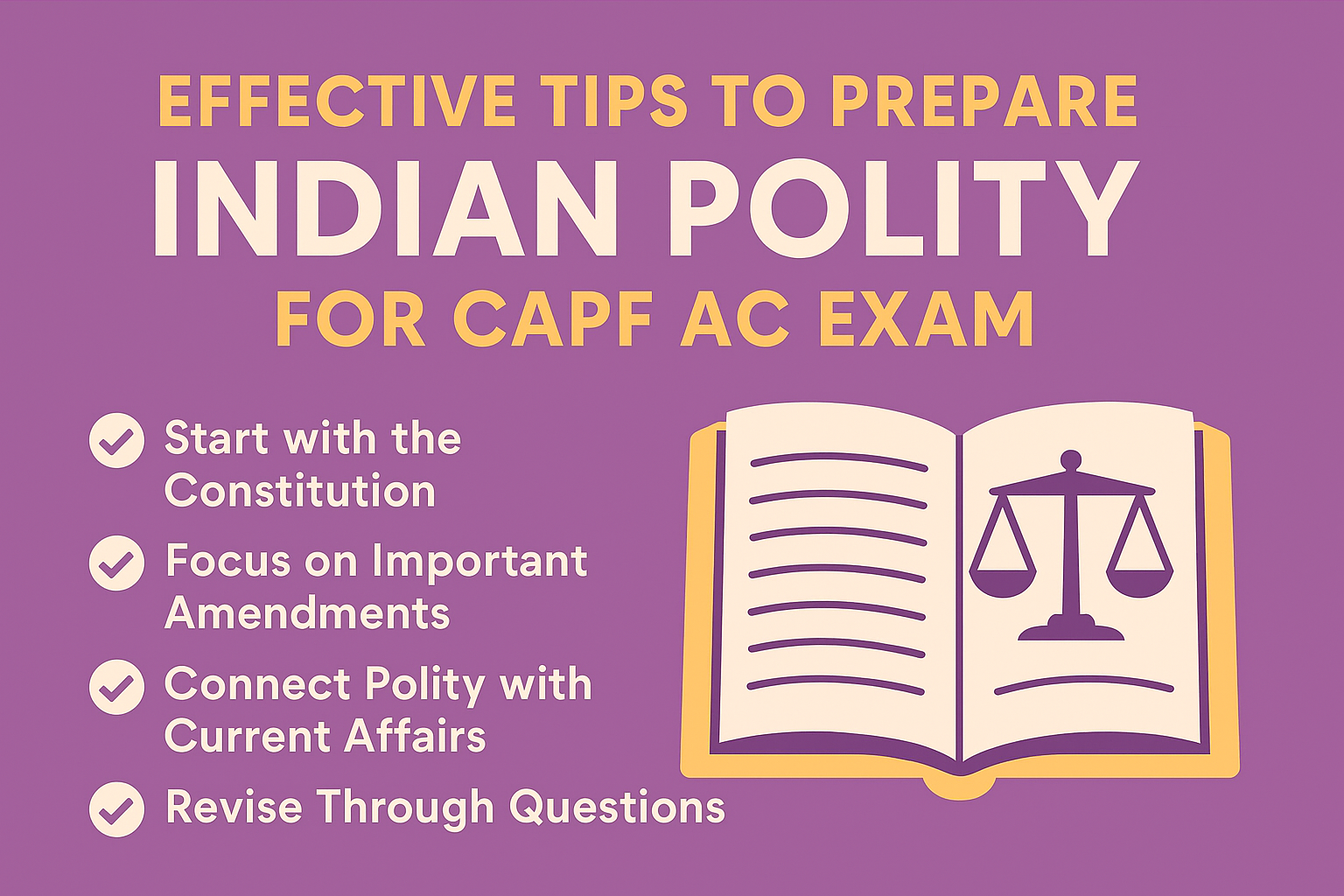Introduction
The CAPF AC Exam, conducted by UPSC, is one of the toughest exams for recruitment into the Central Armed Police Forces. Among the subjects in Paper I (General Ability & Intelligence), Indian Polity is one of the most important and scoring areas. Questions test both static knowledge (from the Constitution) and current relevance (recent bills, amendments, and judgments).
To crack this section, aspirants need clear conceptual understanding, regular revision, and application of Polity in current affairs. In this article, we’ll share effective tips to prepare Indian Polity for CAPF AC Exam and how Victor Growth Coaching guides aspirants to success.
Why Indian Polity is Important for CAPF AC Exam
Weightage: Around 15–20 questions are directly asked from Polity in Paper I.
Static + Dynamic Nature: Combines Constitution theory with real-life applications.
Direct Link to Governance & Administration: Crucial for future officers in CAPF.
Helps in Paper II Essays: Many essay topics are related to governance, democracy, or constitutional issues.
👉 Mastering Polity builds not only exam confidence but also administrative awareness.
Booklist for Indian Polity (CAPF Exam)
NCERTs (Class 9–12): Basics of Civics and Polity.
Indian Polity by M. Laxmikanth: The most recommended book.
Introduction to the Constitution of India – D.D. Basu (for deeper understanding).
Current Affairs Sources: The Hindu, Indian Express, PIB, PRS India.
Effective Tips to Prepare Indian Polity
1. Start with the Constitution
Read the Preamble, Fundamental Rights, Directive Principles, and Fundamental Duties.
Understand their historical background and philosophy.
Focus on important Articles (e.g., Article 14, 19, 21, 32, 368).
2. Study Structure of Government
President, Prime Minister, Parliament, Judiciary, Governors, State Legislatures.
Revise powers, functions, and relations between Centre and States.
Practice flowcharts to simplify topics.
3. Focus on Important Amendments
Learn key amendments like 42nd, 44th, 73rd, 74th, 86th, 101st.
Link them with current events. Example: GST → 101st Amendment.
4. Connect Polity with Current Affairs
Track Supreme Court judgments, new bills, and constitutional debates.
Example: Recent Electoral Bond issues → Representation of People Act.
Make short notes of important updates.
5. Revise Through Questions
Solve previous year CAPF Polity questions to identify patterns.
Attempt weekly quizzes and mock tests.
Focus on concept-based MCQs, not just facts.
6. Memorize Smartly
Use mnemonics and charts for Articles and Schedules.
Example: “FREEDOM 19” → Article 19 covers six freedoms.
7. Prepare for Essays (Paper II)
Common Polity-related essay topics:
Democracy & its challenges
Role of Parliament
Judicial activism
Federalism & Centre-State relations
Practice writing essays with examples from Constitution + Current Affairs.
Common Mistakes to Avoid
❌ Rote learning Articles without understanding.
❌ Ignoring amendments and Supreme Court cases.
❌ Over-reliance on one book without practicing PYQs.
❌ Skipping revision of static topics while focusing only on current affairs.
How Victor Growth Coaching Helps in Polity Preparation
At Victor Growth Coaching, we ensure that Polity is simplified and mastered through:
✅ Structured Classes: Topic-wise coverage of the entire Constitution.
✅ NCERT to Advanced: Basics to in-depth concepts explained.
✅ Current Affairs Integration: Linking Polity with daily news.
✅ Exclusive Notes: Concise Polity handouts for quick revision.
✅ Weekly Polity Quizzes & Tests: To ensure consistent practice.
✅ Essay Writing Training: With feedback on governance-related topics.
✅ Affordable Fee Structure: Making top-quality coaching accessible.
SEO Keywords
Indian Polity for CAPF AC exam
Best Polity preparation strategy CAPF
CAPF 2026 Polity tips
Best CAPF coaching Kerala
Victor Growth CAPF coaching
FAQs on Indian Polity for CAPF AC Exam
Q1. How many questions come from Polity in CAPF Paper I?
Around 15–20 questions, making it a high-weightage section.
Q2. Which is the best book for CAPF Polity preparation?
Indian Polity by M. Laxmikanth is the best, supported by NCERTs.
Q3. Do I need to study the entire Constitution?
Not line by line. Focus on important Articles, Amendments, and structures of government.
Q4. How can I prepare Polity with limited time?
Revise NCERTs + Laxmikanth summaries + practice PYQs.
Q5. Are current affairs important in Polity?
Yes. Many questions link constitutional provisions with recent events.
Q6. Does Victor Growth provide Polity notes?
Yes. Victor Growth provides exclusive handouts and current affairs updates.
Q7. Can Polity help in Paper II essays?
Absolutely. Governance-related essays are common, and Polity knowledge strengthens arguments.







